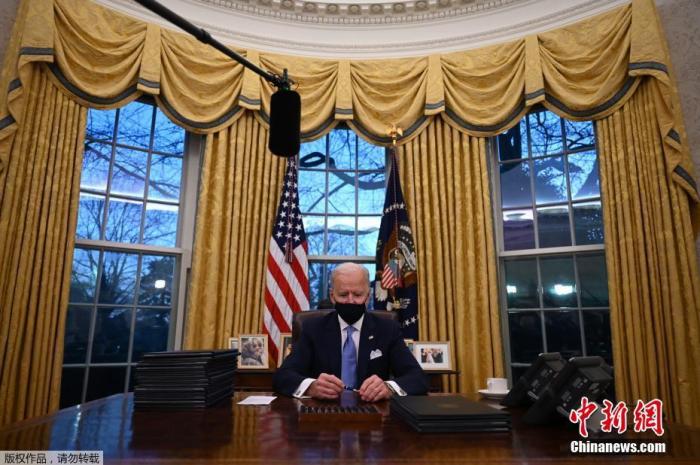China News Service, Washington, February 20th, title:
(Washington Observatory) Biden's inauguration "full moon": the urgency and caution in the "reset" of policies
China News Agency reporter Chen Mengtong
One month has passed since U.S. President Biden was sworn in on January 20.
Regardless of internal affairs or diplomacy, the Biden administration has demonstrated a sense of crisis and urgency in trying to eliminate the influence of its predecessors' policies and fill the "vacuum" in governance as soon as possible.
There is no doubt that the fight against the new crown pneumonia epidemic is the top priority of Biden's work.
The first administrative order signed on the first day of entering the White House and the first inspection site to leave Washington were the mask order and the vaccine research center.
The White House official website shows that as of February 17, Biden has signed a total of 32 administrative orders since he took office, of which 1/3 are related to the epidemic.
The picture shows US President Biden signing an executive order in the Oval Office of the White House in Washington.
On the day before Biden was sworn in, the number of deaths from new coronary pneumonia in the United States exceeded 400,000, and the number of infections exceeded 24 million.
As of the 20th, these two figures have reached 495,000 and 28 million respectively.
Although the U.S. epidemic curve has gradually eased in the past month, insufficient vaccine supply and vaccination capacity, mutated new coronavirus, etc. will create problems for Biden's "100-day plan to fight the epidemic."
"Put on a mask, America." In order to call on the American people, Biden even gave a speech with a mask throughout.
Regarding anti-epidemic expectations, he expressed caution: "I can't tell you when this crisis will end, but we are doing everything possible to make this day come as soon as possible."
If the statistics of the National Public Radio (NPR) are correct, Biden has surpassed Franklin Roosevelt to become the US president who has signed the most executive orders in the first month since 1933.
In contrast, the Legislative Results column of the White House's official website has only one legislative motion.
The 1.9 trillion dollar epidemic relief bill known as the "U.S. rescue plan" is still stagnating on Capitol Hill.
American public opinion believes that the epidemic relief bill has the symbolic significance of "testing" the relationship between government and court in the new legislative cycle.
Biden's other key policy agendas include climate change, immigration policy, medical insurance, race, etc. Almost every item is a traditional dispute in American internal affairs.
The Associated Press said, "Biden can withdraw Trump's policies with a swipe of a pen," but it must be supported by Congress to promote real changes in the governance system.
In terms of foreign policy, Biden bid farewell to the isolated posture of "America First" and demonstrated his strategic intention of "Return of America."
At the beginning of his tenure, he announced that the United States would return to the World Health Organization and the Paris Agreement on climate change, and expressed that he would actively participate in global cooperation against the new crown epidemic.
Whether it is policy speeches delivered at the State Department and the Pentagon, or facing European allies on the other side of the Atlantic, "America is back" is a clear signal from Biden.
In the face of competition from major powers, the Biden administration quickly renewed the "New Strategic Arms Reduction Treaty" with Russia, but displayed a tough attitude towards Russia on issues such as Ukraine.
In his speech at the Munich Security Conference, Biden mentioned issues such as "preparing for long-term strategic competition with China" and "response to Russian threats."
He said, "This is not a struggle between East and West, nor is we wanting to conflict." "We must never return to the diametrically opposed and rigid situation of the Cold War."
The Washington Post pointed out that compared with the clear priorities in the internal affairs field, the world is still observing how the Biden administration responds to some "early tests" in the diplomatic field of the United States.
"He also needs to show the world that he is not an easily persuaded person."
In addition to intensive domestic and foreign policy adjustments, Biden also had to face the interference of his predecessors' "legacy issues".
The second impeachment trial against former President Trump lasted for nearly a week.
This not only grabs media headlines, but also involves a lot of time and energy for members of Congress.
The situation of the Biden epidemic relief bill negotiations and the second Trump impeachment case "crashing" on the Senate agenda was described by polling expert Zogby as "two elephants squeezing into one room."
"What has been missing for 4 years is back: this month has passed like a month." An MSNBC column commented on the "full moon" of Biden's administration.
The article said that the Biden administration has almost no "drama" of the previous administration, but behind the normal work of the government, it is a "combination of relief and anxiety."
According to statistics from the American political analysis website "FiveThirtyEight", Biden's poll support rate in the first month of his tenure fluctuates between 53-55%.
The "honeymoon period" of the New Deal can be described as tepid.
Although he hopes that his cabinet team will "be able to work immediately from the first day in office", more than half of the 15 cabinet ministers nominated by Biden have been approved by Congress.
The differences in public opinion remain, and Congress continues to hold back.
After the fight against the epidemic, how will Biden fulfill the "unity" vision he has repeatedly called for in his inauguration speech?
The rapidly changing international situation, like a rare ice storm in Texas, will leave much room for the new US government to take the initiative?
For Biden, the answer lies in time, and time is also a challenge.
(Finish)

